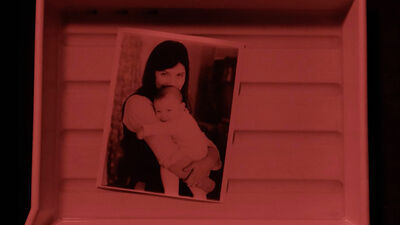
For thirty-two years, the Republic of Artsakh, a tiny country in the South Caucasus, flourished under its own flag before falling to invasion by Azerbaijan, forcing its inhabitants to be displaced mostly in its welcoming neighbor Armenia. Director Emily Mkrtichian’s “There Was, There Was Not,” a documentary whose name derives from how Armenian fairy tales begin, recalls the country’s idyllic scenes before invasion and the destruction that occurred thereafter through the eyes of four women.
Mkrtichian has an intriguing quartet of subjects: Sose Balasanyan is a soft-hearted Judo instructor and world-class competitor; the undeterred Siranush Sargsyan is running for public office in a male dominated political field. While supporting her three daughters, the fearless Sveta Harutunyan defuses landmines littered across the countryside from the previous war; Gayane Hambardzumyan works at a Women’s Center she founded to help heal the scars of abuse. Scenes featuring Sose’s adorable grandmother give the first half of the film a lightness; as do seeing these women living empowering professional lives. That gaiety crumbles in the second half, as missiles shatter the ground and the skies are lit by ammunition. Each woman loses something, only granted a shell of a new life to replace their now destroyed homes.
Sometimes the editing between women is too choppy, as though Mkrtichian is conscious of giving each woman an equal amount of screen time. With that in mind, I wish we spent more time with Sose: She experiences the sharpest decline, eventually granting rote militaristic quotes about reclaiming her homeland. It would be wonderful to have more than those short, curt reactions (some of that briefness, to be fair, could stem from the limits of Sose recording from the front lines). Still, as a record of the psychological traumas and emotional hurts war and displacement can instigate, giving us a kind of before-and-after picture, “There Was, There Was Not” is a powerful tribute to a former country, and a frustrating illustration of a people’s dream turned nightmare.
It was only a couple of weeks ago while at the Berlin International Film Festival that I watched “No Other Land,” an aching, unforgettable film from an Israeli-Palestinian collective about the displacement of a Palestinian village. At True/False is another work about Palestinian displacement, which like “A Photographic Memory,” sees a filmmaker taking the images shot by their parent to recollect a somewhat fuzzy, tragic childhood.

Yousef Srouji’s “Three Promises” is a harrowing labor of recollection: It takes place over the courts of a year, from 2000 through 2001, with Israeli forces retaliating due to the second intifada (“uprising”) in the West Bank. Srouji and his sister were just kids when the bombing began. Before long, his parents gathered up some belongings and ventured down to the basement for a modicum of protection. During that time, Srouji’s mother, Suha Srouji, filmed everything from her children’s distress to the ways their life were turned upside down by the conflict. Through each brush with death, which appears to approach nearer and nearer, Srouji’s mom makes three separate promises to God that if the family survives the next surge, the family will depart from Palestine. But the love for her homeland is too strong, and each time she goes back on those deals with Gods until there is no turning back.

